
 The Spirits are everywhere in Yikpa. They inhabit the ground and the air. Some spirits inhabit trees, animals, people. Some spirits are fickle and vain. Some are kind and helpful. Some are mean; some are gentle.
The Spirits are everywhere in Yikpa. They inhabit the ground and the air. Some spirits inhabit trees, animals, people. Some spirits are fickle and vain. Some are kind and helpful. Some are mean; some are gentle.
The people of Yikpa have many ways for dealing with the spirits. They pray. They speak to the spirits, reassuring them, calming them, imploring them, flattering them. They take care of the spirits, offering them gin, cigarettes, chickens, occasionally a goat. In return, the spirits help the people of Yikpa. They can heal and destroy, clarify and confuse, bring power and destruction.
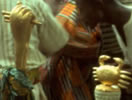
Most spirits are the ancestors of the people of Yikpa. The people who came before us, after they die, watch us from the beyond, meddling, intervening, in the affairs of the living. But there are also other, more powerful ancient spirits. These have been handed down from many generations before. Those spirits can protect a family from harm, disease, poverty. They can also unleash trouble on enemies, and they can turn on their guardians, if their people neglect their duties, or offend the often complicated rules, taboos and requirements of the spirits. Often spirits are associated with a fétish - usually a 10-20 inch (30-60 cm) mud figure with fairly simple features.
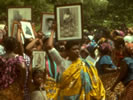
The spirits are everywhere and they are part of everything. In Yikpa there are ceremonies for every occasion. Small offering are made from every meal and most drinks (no water, no brown liquor). When I decided to build my house in Yikpa, the old man did several ceremonies, which involved two bottles of Gordon's gin. He asked the ancestors for permission to give me a plot of land for my house. When I had problems with poisonous army ants invading my house and killing my chickens, the old man gave me some grains of corn that he had done some ceremony over, and the ants were gone within days. No occasion is wasted to pour a shot of gin and say a prayer in honor of the ancestors. Most celebrations and festivals involve chickens or goats being ceremonially slaughtered, with their blood offered to the spirits.
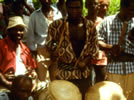
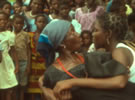
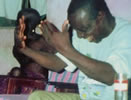 On a few occasions I was privileged to attend spiritual events. The yams festival in August is an elaborate celebration of the harvest of the new yams - a key staple all over West Africa. In Yikpa it involved several sacrifices to the most sacred spirit of the chief's family. The fétish for that spirit was kept in a small mud brick house inside the chief's compound.
On a few occasions I was privileged to attend spiritual events. The yams festival in August is an elaborate celebration of the harvest of the new yams - a key staple all over West Africa. In Yikpa it involved several sacrifices to the most sacred spirit of the chief's family. The fétish for that spirit was kept in a small mud brick house inside the chief's compound.
All evening there was music and food and drink and lots of prayer around the small tin-roofed mud brick structure that houses the fétish. After nightfall the festivities became more and more intense and the palm wine was flowing. With the drums roaring and the dancers pounding the ground, several people became possessed by spirits and began rolling on the ground in convulsions and speaking in tongues. Now several of the men took off their shirts and proceeded into the inner-sanctum for the climax of the ceremony. After a while more people entered and brought some chickens along. My friends brought me the white rooster we had bought on the market the other day and a bottle of Gordon's gin. They instructed me to take off my shirt and we entered the dimly lit hut.
In the first room, there was a small fétish, and we sat down and started saying prayers and pouring gin on the figure. Then we got up and moved to the next room , with a bigger, more powerful spirit. We said some more prayers and spilled some more gin. Then we proceeded to the "inner sanctum" a larger windowless room with a single kerosene lamp in the corner. The flickering lamp cast restless, dancing shadows on the whitewashed walls. The old men were gathered around a large mud fétish in the middle of the room. The fétish was decorated with red and white paint and white feathers, and splattered with chicken blood. Several calabashes with smoldering herbs filled the hot musty room with the sweet, fragrant smoke of pot.
Approximately in the early seventeenth century, this spirit had been brought from Notsé when the Ewe people fled the tyrannical rule of king Agokoli (more). The walls of Notsé were made from mud mixed with blood and some of the slaves were saving water from their rations to soften the mud of the walls. Thus they were able to slowly scrape away enough mud to make a hole to escape. In one version of the story, I heard, they made the fétish from the bloody mud they scraped away from the walls of Notsé. In another version, the fleeing Ewe stole this powerful fétish from their masters. All agree that the fleeing people carried the fétish from Notsé to the mountains and grateful for their successful escape, they made it their main protective spirit.
This fétish brings strength to the people of Yikpa. It was scraped by their ancestors from from the bloody walls of oppression and slavery. It casts the shadows of three hundred years of survival onto the walls of that hot, musty room. The calm murmur of the prayers addressing the restless shadows of the spirits reinforce the connection of the people to the strength of their forbears.
The old man took the white rooster by the wings, held it over the fétish addressing the spirit, talking to the rooster, shaking it a bit. Then he swiftly pulled some tail feathers from the rooster and placed them on the fétish. I was handed a sharp knife, and the old man carefully bent the head of the rooster back. I approached the fétish and the rooster and spoke a brief prayer asking for health and prosperity and peace for the village, which was translated by the old man's son into Ewe (just to be sure). Then I slit the throat of the rooster with the knife and the old man dribbled the squirts of rooster blood onto the fétish, then on the feathers at the foot of the fétish. Soon, the rooster went limp and perished. The old man placed it next to the fétish and we broke out the gin. We had several rounds of gin and prayers and more gin. Ample quantities were splashed on the fétish and on the ground. More was downed from the shot glasses. Some was sprayed on the fétish - with a hearty "DAFOOO-LOOO!!"
Many people visited the fétish that night, asking for help and protection, and offering chickens and gin and other appropriate offerings. The next day the ceremonies were wrapped up by preparing a huge feast with rice and new yams, and lots of chicken. More palm wine was brought out and more prayers were said.
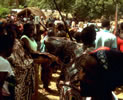
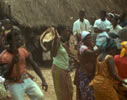
Death is an important part of life in Yikpa. The passage from this life to the other side is the most important event for a person. Old people are honored and valued as resources of knowledge and experience for the community. When an old member of the community dies, the family often will put all the resources they can muster into a great, exuberant funeral. These celebrations can last for days and result in years of paying off debt for the family. But it is considered important to give the departing family member a proud and graceful farewell to the afterlife.
The opulence of funerals also plays a role in the status of a family in the community. The ability of a family to show off wealth and good taste is seen as a sign of powerful spirituality. And a family's good relationship with their ancestors and spirits, in turn, makes it more respected and more powerful in the community.
Funerals are also an important social event, where far-flung family members come back to the village, where young people meet, and the elders pass on stories and family lore. Neighbors and friends gather to pay their last respect, and to socialize and exchange the latest news and gossip. And usually the hosts take pride and great care to demonstrate the greatest possible measure of hospitality and grace. Often disputes and quarrels are set aside to honor the deceased and to respect the mourning of the family.

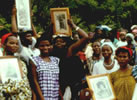
The interaction between the people and the spirits is complicated. But there are some people among the people of Yikpa who have special knowledge and gifts, and special access to the spirits. These people may use this power for good or bad. And some end up being more successful at controlling these powers, than others. I do not know very much about what these people do, but from what I gathered there are several types:
- seers
- healers
- sorcerers and witches
In and of itself, none of these categories of people describe the intentions of the person. The seers and healers, however, are publicly available professionals who can be consulted. The sorcerers (I wish I could find a less dramatic term) can be good or evil, and most of the time, from what I was told, are somewhere in between. They are human.
I knew a powerful sorcerer. At the time I would not have called him that. Only later I realized that that was what he was. But, like most yikpato, I was quite aware of his powers and reputation, just as I knew some of his weaknesses and failings. He was something of a village drunk. An old man who sometimes could be seen stumbling across the village to get yet another drink. Sometimes his wife would lock him out until he sobered up. There is no privacy in the village.
Yet, this silly old man was also a master of the old arts. He knew all the herbs, roots and animals. With a simple ceremony, he could make the river move to make room for a new field. He could invoke powerful protections for his family and at one point he was involved in a brutal, deadly feud.
One night, well after midnight, I was woken up and asked to get the car out. There was a problem at the little dispensaire - the village pharmacy. When I got there, I found a pregnant woman from the village; she was pale, cold, sweaty and unconscious. She was dying. The so-called "health care worker" there, for some reason, had decided to induce labor. But she was only eight months pregnant, seriously anemic, and had a pretty bad case of malaria. Apparently, she started having contractions, started bleeding uncontrollably and then she fell unconscious. Her family wanted me to take her over the mountain to the Baptist missionary hospital. It was pretty clear that she was going to die en route. There was no way she would survive a bumpy hourlong taxi ride.
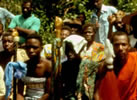
Other info
Voodoo and West Africa's Spiritual Life NPR/Nat. Geographic
This was a tricky situation. I could hardly decline this desperate request. But if she did die in my car it could be bad for business - really bad. My apprentice quickly suggested that the woman's only real hope was to take her to the sorcerer. The family agreed, and we took her to his house. He came out and took one look at the woman. He told the women to take her to his room.
There he spent all night trying to save this woman. It was quiet, just the flickering of his lantern could be seen. At dawn he came out and asked for some soup for the woman. When they brought the soup, the woman was actually able to eat the soup. Even though the baby did not survive, saving the life of the woman was an incredible feat. Everyone agreed that he must have invoked some very powerful spirits to accomplish this.
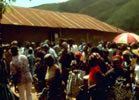
Here is the story I heard from a Peace Corps volunteer:
At one point, this Peace Corps volunteer went to see the village sorcerer for a courtesy visit. He had a bit of a dubious reputation, but was nevertheless an important personality in the village. He insisted that he would tell her fortune, for free, just to be friendly. So she agreed. He got ready and did a little ceremony, said a prayer and then he announced:" OK - this is the part where we take off our clothes!" The Peace Corps volunteer laughed and declined politely but firmly:"Nice try!" The sorcerer continued his séance and finally, at the dramatic climax of the ceremony, he pulled out an old rotary telephone, yanked the receiver off the cradle and solemnly spoke into the mouthpiece:"hello spirits!"